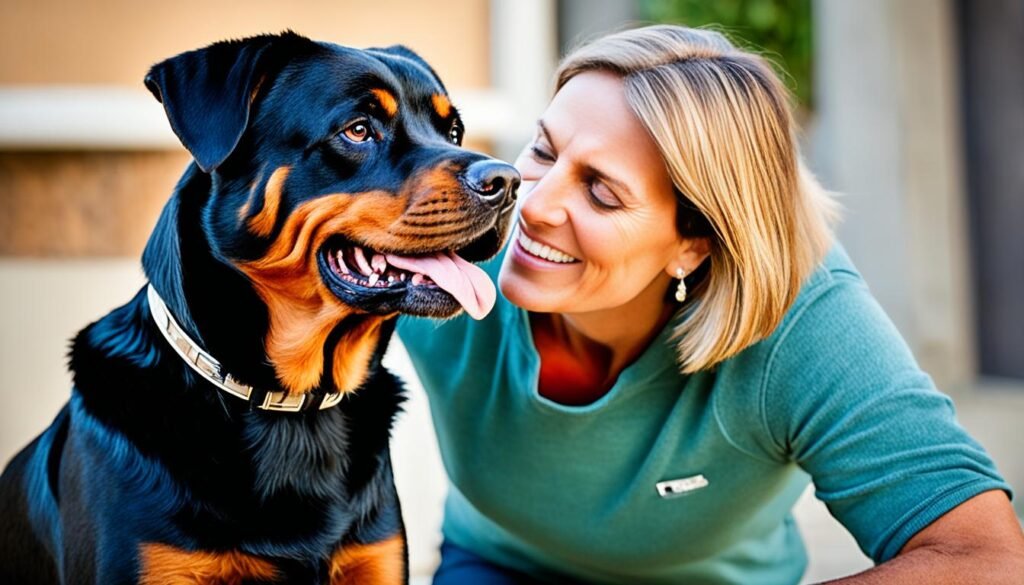When it comes to Rottweilers, there is often a misconception that they are aggressive and unpredictable. However, as a proud owner of a Rottweiler myself, I can confidently say that this is far from the truth. Rottweilers are not only capable of immense loyalty, but they also have a natural inclination towards forming strong bonds with their families.
It’s important to understand that a Rottweiler’s loyalty is influenced by several factors, including their upbringing, socialization, and training. As a breed, Rottweilers have a rich history of serving humans in various capacities, including herding livestock and guarding property. These historical roles have shaped their instincts for protectiveness and loyalty.
However, it’s essential to remember that a Rottweiler’s individual temperament can vary based on genetics, upbringing, and environment. When provided with proper care, training, and socialization, they can exhibit confidence, good-naturedness, and unwavering loyalty towards their loved ones.
Key Takeaways:
- Rottweilers are often misunderstood. They have the potential to be loyal and loving companions.
- A Rottweiler’s loyalty is influenced by factors such as upbringing, socialization, and training.
- Proper care, training, and socialization are essential in unlocking a Rottweiler’s full potential as a loyal family pet.
- Individual temperament can vary, but when treated well, Rottweilers can be confident and devoted.
- Rottweilers have a rich history of serving humans, which has shaped their instincts for protectiveness and loyalty.
Historical Roles and Instincts of Rottweilers
Throughout history, Rottweilers have played crucial roles in serving humans. Whether it was herding livestock or guarding property, these loyal dogs showcased their remarkable temperament and characteristics. Over the years, Rottweilers have developed a reputation for being a loyal dog breed with a strong sense of dedication to their tasks.
With their strong, robust physique and intelligent nature, Rottweilers were well-suited for the demanding roles they have played. These historical responsibilities required Rottweilers to be brave, strong, and biddable. Their instincts evolved to include wariness and protectiveness, traits that are often misunderstood as aggression. However, these instincts actually reflect their loyalty and devotion to their duties.
It’s important to understand that the temperament of a Rottweiler is shaped by their history and the purpose for which they were bred. By acknowledging their historical roles and instincts, we gain insight into the true essence of this remarkable breed.
Guardians and Helpers
Rottweilers have a long-standing reputation as excellent guard dogs. Their history as protectors of property allowed them to develop a keen awareness of their surroundings and an instinctive drive to keep their loved ones safe. Rottweilers are known for their unwavering loyalty to their families, which drives their natural inclination to protect.
Additionally, Rottweilers have excelled in various other roles, such as search and rescue, police work, and therapy dog programs. Their intelligence, loyalty, and ability to remain calm under pressure make them highly versatile and valuable in a variety of situations.
Bonding with Humans
Rottweilers have a special bond with their human companions. Their loyal nature makes them excellent family dogs and dependable companions. When properly trained and socialized from a young age, Rottweilers exhibit a loving and affectionate temperament. Their loyalty knows no bounds, and they thrive when given the opportunity to form deep connections with their human family members.
The Influence of Individual Temperament and Environment

While Rottweilers have a certain temperament as a breed, individual temperament can vary based on genetics, upbringing, and environment.
When treated well and trained properly, Rottweilers can be confident, good-natured, and very devoted to their families. Proper socialization and training are crucial in building loyalty and preventing aggression.
Rottweiler loyalty facts reveal that these dogs thrive in an environment that provides love, care, and consistent guidance. By building a strong bond with your Rottweiler, you can establish trust and create a loyal relationship that lasts a lifetime.
The Role of Genetics
Genetics play a significant role in a Rottweiler’s temperament. Responsible breeders strive to produce puppies with stable and balanced personalities. By selecting breeding pairs with desirable traits, they can enhance loyalty and trainability in their offspring.
The Impact of Upbringing
From the moment you bring your Rottweiler puppy home, their upbringing greatly influences their temperament. Providing a nurturing environment with positive experiences helps build confidence and trust. Consistent discipline and positive reinforcement training are key to shaping their behavior.
The Power of Socialization
Socialization is essential for a Rottweiler’s development. Exposing them to various people, animals, and environments from a young age helps them become well-rounded and adaptable. It also reduces the likelihood of fear-based aggression and promotes a loyal and friendly nature.
The Importance of Training
Training your Rottweiler is crucial for building loyalty and preventing aggressive behaviors. Positive reinforcement techniques, such as rewards and praise, help strengthen the bond between you and your dog. By teaching them obedience commands and proper behavior, you establish yourself as a trusted leader and foster their loyalty.
Understanding the influence of individual temperament and environment is vital in building a strong and loyal relationship with your Rottweiler. By providing love, guidance, and positive experiences, you can nurture their natural loyalty and create a lifelong bond.
Training and Socialization: Key to a Well-Behaved Rottweiler

Training and socialization play a crucial role in shaping a Rottweiler’s behavior and ensuring they become well-behaved companions. With the right approach, your Rottweiler can develop the necessary skills and behaviors to become a loyal and obedient family pet.
When it comes to training, starting early is essential. Young Rottweilers are sponges for learning and can absorb commands and concepts quickly. Begin with basic obedience training, teaching commands such as sit, stay, and come. Use positive reinforcement techniques, offering treats and praise for good behavior to motivate your Rottweiler and reinforce positive habits.
Rottweilers are intelligent dogs, so mental stimulation is just as important as physical exercise. Engage them in puzzle toys, interactive games, and regular training sessions to keep their minds sharp and focused. This will prevent boredom and help them channel their energy into positive activities.
Socialization is another critical aspect of training a Rottweiler. By exposing them to a wide range of people, animals, and environments from a young age, you can shape their behavior and teach them appropriate responses in different situations. Plan regular outings to the park, puppy classes, and other social settings to help your Rottweiler become comfortable and well-behaved around strangers, children, and other pets.
Tips for Effective Rottweiler Training:
- Start training early with basic obedience commands.
- Use positive reinforcement techniques, such as treats and praise.
- Provide mental stimulation through puzzle toys and interactive games.
- Regularly expose your Rottweiler to various people, animals, and environments.
- Enroll in puppy classes or seek assistance from professional trainers if needed.
Remember, consistency and patience are key when training a Rottweiler. Set clear expectations, be firm but fair, and always reward good behavior. By investing time and effort into training and socialization, you can foster a strong bond with your Rottweiler and enjoy the benefits of having a loyal and well-behaved companion.
Factors Contributing to Aggression in Rottweilers

While Rottweilers are known for their loyalty and devotion, it’s important to understand that various factors can contribute to aggressive tendencies in these dogs. It is crucial to address these factors responsibly to ensure a harmonious relationship with your Rottweiler companion.
Fear and Anxiety:
Like any other dog breed, Rottweilers can display aggressive behavior when they feel fearful or anxious. Stressed or scared Rottweilers may exhibit defensive aggression as a way to protect themselves. It is essential to create a calm and secure environment for your Rottweiler, providing consistent reassurance and positive experiences to help alleviate their fears.
Health Issues:
Certain health conditions, such as hypothyroidism and neurological disorders, can affect a Rottweiler’s behavior and contribute to aggression. It’s essential to maintain regular veterinary check-ups and address any underlying health issues promptly. Treating these medical conditions can help alleviate aggression stemming from physical discomfort or imbalances.
Inadequate Socialization and Training:
Socialization and training play a vital role in shaping a Rottweiler’s behavior and preventing fear-based aggression. It is important to expose your Rottweiler to various environments, people, and animals from a young age, helping them develop confidence and positive associations. Consistent training using positive reinforcement techniques can also establish clear boundaries and teach appropriate behaviors.
Conclusion
Rottweilers are known for their loyal and protective nature, making them excellent companions when raised and trained responsibly. These dogs have a natural inclination towards forming strong bonds with their families and are highly affectionate. However, reaping the benefits of owning a loyal Rottweiler requires responsible ownership.
Training and socialization play a vital role in shaping a Rottweiler’s temperament and behavior. By providing consistent, positive reinforcement training and exposing them to various environments, you can ensure that your Rottweiler becomes a well-behaved and obedient pet. Proper socialization helps them develop appropriate behaviors and prevents fear-based aggression.
A loving and stable environment is essential for a Rottweiler to thrive. They require a dedicated owner who can provide them with the care and attention they need. As a loyal dog breed, Rottweilers excel in protecting their families and properties. By providing them with a nurturing environment, you can unlock their full potential as loyal and loving family pets.
In conclusion, owning a loyal Rottweiler can bring numerous benefits to your life. Their loyalty, affection, and protective nature make them an excellent companion, while their intelligence and devotion make them highly trainable. With responsible ownership and proper training, you can experience the joys of having a devoted and loyal Rottweiler by your side.
FAQ
Are Rottweilers naturally loyal?
Yes, Rottweilers have a natural inclination towards loyalty and devotion to their families. When raised and trained responsibly, they can be incredibly loyal companions.
Are Rottweilers aggressive?
Rottweilers are often misunderstood as aggressive due to their protective nature. However, their temperament is influenced by various factors, and with proper training and socialization, they can be well-behaved and good-natured.
How can I build loyalty with my Rottweiler?
Building loyalty with your Rottweiler involves training, socialization, and providing a loving and stable environment. Positive reinforcement training, consistent socialization, and bonding activities can help strengthen the bond between you and your Rottweiler.
What are the historical roles and instincts of Rottweilers?
Rottweilers have a rich history of herding livestock and guarding property. These roles required them to be strong, brave, intelligent, and obedient, shaping their instincts for wariness and protectiveness.
Can individual temperament affect a Rottweiler’s loyalty?
Yes, while Rottweilers have a certain temperament as a breed, individual temperament can vary based on genetics, upbringing, and environment. Proper training and socialization can shape a Rottweiler’s behavior and enhance their loyalty.
How important is training and socialization for Rottweilers?
Training and socialization are crucial for shaping a Rottweiler’s behavior and ensuring they become well-behaved companions. Basic obedience training and exposure to various environments from a young age can help develop their loyalty and prevent aggression.
What factors can contribute to aggression in Rottweilers?
Several factors can contribute to aggression in Rottweilers, including fear, anxiety, health issues, and inadequate socialization and training. Identifying and addressing these factors can help prevent fear-based aggression and promote loyalty.
What are the benefits of owning a loyal Rottweiler?
Owning a loyal Rottweiler can provide many benefits, such as a strong bond, companionship, protection, and a sense of security. Their loyalty and devotion make them excellent family pets when properly raised and trained.
